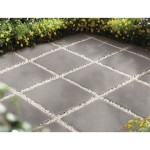The Benefits of Installing Tile for Patios and Gardens
Patios and gardens serve as extensions of the living space, offering areas for relaxation, entertainment, and connection with nature. Selecting the right material for flooring and pathways is crucial for both aesthetic appeal and functional performance. Tile has emerged as a popular choice for patios and gardens due to its diverse range of options, durability, and ease of maintenance. This article explores the multifaceted benefits of installing tile in outdoor spaces.
The use of tile in outdoor spaces dates back centuries, with examples found in ancient Roman courtyards and Persian gardens. The enduring appeal of tile lies in its ability to blend practicality with visual appeal. Modern manufacturing techniques have further enhanced the properties of tile, making it even more suitable for the demanding conditions of outdoor environments. Factors such as climate, intended use, and design preferences should be carefully considered when choosing tile for patios and gardens.
Durability and Weather Resistance
One of the primary advantages of tile is its inherent durability. Quality tiles are manufactured to withstand a variety of environmental stressors, including extreme temperatures, moisture, and sunlight. Porcelain tiles, in particular, are known for their high density and low water absorption rates, making them exceptionally resistant to cracking and fading. This resistance translates into a longer lifespan compared to other common patio materials such as wood or concrete.
The ability to withstand fluctuating temperatures is particularly important in regions with harsh winters or hot summers. Tiles specifically designed for outdoor use are often frost-resistant, meaning they can endure repeated freeze-thaw cycles without sustaining damage. This characteristic is critical for preventing the cracking and crumbling that can occur with materials that absorb moisture and expand during freezing temperatures.
Resistance to sunlight is another critical consideration. Prolonged exposure to ultraviolet (UV) radiation can cause some materials to fade or degrade over time. High-quality tiles are often UV-resistant, ensuring that their color and appearance remain consistent for many years. This characteristic is especially important for patios and gardens that receive direct sunlight for extended periods.
In addition to weather resistance, tiles are also resistant to staining and scratching. This makes them a practical choice for areas that are frequently used for entertaining or where spills are likely to occur. Many tiles are treated with a protective coating that further enhances their resistance to stains and scratches, making them easy to clean and maintain.
The durability of tile extends to its resistance to pests and insects. Unlike wood, tile is not susceptible to damage from termites or other wood-boring insects. This makes it a low-maintenance option for gardens and patios, as there is no need to apply pesticides or take other preventative measures to protect against insect infestations.
Furthermore, the compressive strength of tile makes it suitable for high-traffic areas. Well-installed tile can withstand significant weight and pressure without cracking or shifting. This is particularly important for patios and pathways that are frequently used for walking, entertaining, or supporting heavy furniture.
Design Versatility and Aesthetic Appeal
The wide array of styles, colors, sizes, and textures available in tile is a significant benefit for homeowners seeking to customize their outdoor spaces. Tile can mimic the appearance of natural stone, wood, or other materials, allowing for a seamless integration with the surrounding landscape. This versatility makes it possible to create patios and gardens that reflect individual design preferences and complement the architectural style of the home.
Different types of tile offer distinct aesthetic qualities. Porcelain tiles, for example, can be manufactured to resemble a variety of natural stones, such as granite, marble, or slate. This allows homeowners to achieve the look of natural stone without the associated cost and maintenance requirements. Similarly, wood-look tiles offer the warmth and texture of wood without the susceptibility to moisture damage and rot.
The size and shape of tiles can also significantly impact the overall design of a patio or garden. Larger tiles can create a more expansive and modern look, while smaller tiles can be used to create intricate patterns and designs. Mosaic tiles, in particular, offer endless possibilities for creating custom patterns and designs that reflect individual creativity and style.
The color of the tile is another crucial consideration. Neutral colors, such as beige, gray, or brown, can create a calming and harmonious atmosphere, while brighter colors can add a pop of visual interest and energy to the space. The choice of color should be carefully considered in relation to the surrounding landscape and the overall design aesthetic.
Textured tiles can add depth and dimension to a patio or garden. Tiles with a textured surface can also provide better traction, making them a safer choice for areas that are prone to moisture or where children or elderly individuals may be walking. The texture of the tile can also enhance its visual appeal, creating a more natural and organic look.
The ability to seamlessly integrate tile with other landscaping elements is another advantage. Tile can be used to create borders, pathways, or focal points within a garden, enhancing its overall aesthetic appeal. It can also be used to create a smooth transition between indoor and outdoor spaces, blurring the lines between the two and creating a more cohesive living environment.
Ease of Maintenance and Cleaning
Compared to other patio materials like wood or concrete, tile is relatively easy to maintain. Its non-porous surface resists stains and mildew, making it simple to clean. Regular sweeping and occasional washing with a mild detergent are typically sufficient to keep tile looking its best. This low-maintenance characteristic is especially appealing to homeowners who prefer to spend their time enjoying their outdoor spaces rather than maintaining them.
The resistance to stains is a significant advantage. Spills from food, drinks, or other substances can be easily wiped away without leaving a permanent mark. This is particularly important for patios that are frequently used for entertaining or where children are present. The ability to quickly and easily clean up spills helps to maintain the overall appearance of the patio and prevent the build-up of unsightly stains.
The resistance to mildew is another key benefit, especially in humid environments. Mildew can grow on surfaces that are constantly exposed to moisture, leading to discoloration and unpleasant odors. Tile's non-porous surface inhibits the growth of mildew, making it a more hygienic and visually appealing option for patios and gardens.
Unlike wood, tile does not require periodic sealing or staining to maintain its appearance and protect it from the elements. This eliminates the need for costly and time-consuming maintenance tasks, saving homeowners both time and money. The absence of the need for chemical treatments also makes tile a more environmentally friendly option.
The smooth surface of tile makes it easy to sweep and mop, removing dirt and debris quickly and efficiently. This is particularly important for patios that are located near gardens or other areas where dirt and debris are likely to accumulate. Regular sweeping helps to prevent the build-up of dirt and debris, keeping the patio looking clean and inviting.
In addition to regular cleaning, tile may occasionally require more thorough cleaning to remove stubborn stains or grime. This can be accomplished using a pressure washer or a specialized tile cleaner. However, even with occasional deep cleaning, tile remains a relatively low-maintenance option compared to other patio materials.
Proper installation is crucial for ensuring the longevity and ease of maintenance of tile. A properly installed tile patio will be less prone to cracking, shifting, and other problems that can lead to increased maintenance requirements. It is therefore important to hire a qualified contractor to install tile patios and gardens to ensure that the job is done correctly.

Transform Your Patio With Outdoor Tile Ideas And Inspiration

Are 20mm Thick Porcelain Tiles Ideal For Outdoors Tile Merchant

Transform Your Outdoor Spaces The Benefits Of Cement Tiles

Outdoor Tiles Choosing The Right Tile For Your Patio

How To Install Outdoor Porcelain Tiles Tile Merchant

How To Install Outdoor Tiles Porcelain Super

How To Install Porcelain Outdoor Floor Tiles In Your Garden Royale Stones Blog

Best Material For Outdoor Tiles Steps Tile Merchant

The Benefits Of Using Rock Tite To Install Porcelain Paving Slabs Walls And Floors
Outdoor Floor Tiles Why Choose Porcelain
Related Posts








